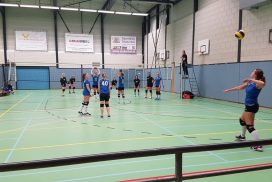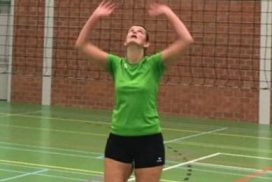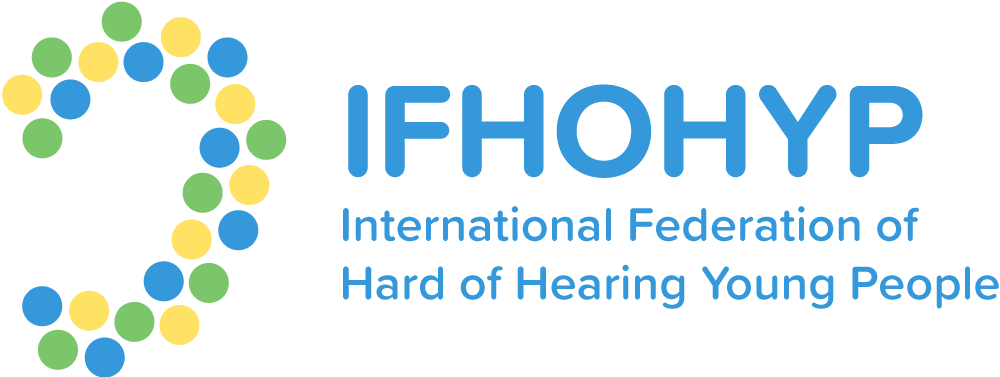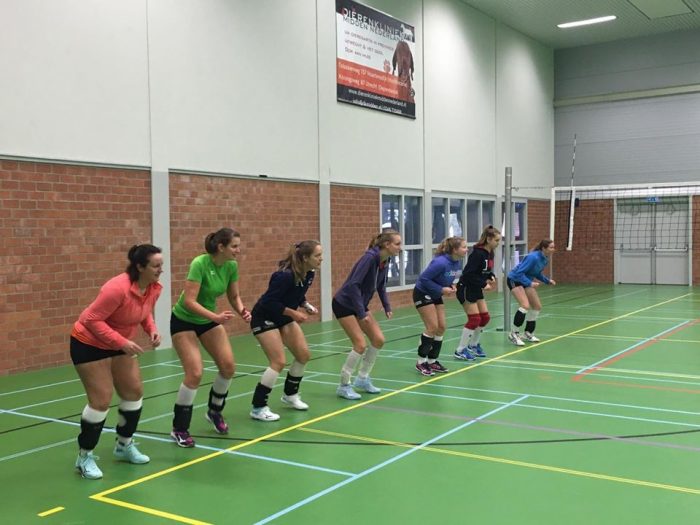Interview with Maartje Schutte who is participating in training for the Deaf Volleyball World Championships 2020 in Italy
Hi! Today we are meeting with Maartje Schutte, who is currently training for the Deaf Volleyball World Championships 2020 in Italy.
Hi, Maartje! Can you tell us more about yourself? Who are you and where are you from?
Hi! I'm a Dutch girl who grew up in the province of North Holland. Yes, between the mills and tulips that you always see on postcards.
After studying public safety management I chose to work in the area of public interest. I believe that a lot of issues and problems in society can be solved with an integral approach.
I work as a public safety advisor for different local governments. I also volunteered in different capacities, such as referee at youth sport teams, board member of SH-Jong (the Dutch HoHYP organisation) and the Royal Dutch Deaf Sports Bond. Sport is very important in my life. I love to play fast and strategic ball games, such as handball and volleyball.
And last, but not least I'm Keith's girlfriend.
Did you play any sport yourself before working as referee? How did you become a referee?
At sports clubs it is customary to do some volunteering as a referee for younger teams and/or serve bar in the canteen. So people, especially young people could play sports and after a match they could get some drinks and food.
What sports clubs did you join? And why?
When I got my swimming diplomas as a child (in the Netherlands is it usual for young children to take swimming lessons, with all the water we got here in our country) my parents told me I may choose one sport to play. At that time I transitioned from special education for hard of hearing children in another town to a regular elementary school near my home. My best friend at that school played handball and took me to a training session. I was immediately impressed by the game and all the moves you have to make. When I was about 14, I started playing handball. At 16, I started playing volleyball with hard of hearing and deaf friends. We participated in recreational tournaments organised by deaf sports clubs.
Later, at 23, I got a cochlear implant. After several tries I became a handball goalie. This was because when I was a field player, my CI would flow away and it was too delicate to play on the field with all the balls and arms in the vicinity. Communication became more difficult as well and I didn’t have that much fun on the field anymore. During my time as goalie I started to play more and more volleyball with my friends. I found out that volleyball was more fun than handball. At volleyball you have more overview of what's going on on the field, which gave me more opportunities to communicate.
After I moved to another town I became a member of a deaf volleyball team in which I learnt the basics of volleyball. Later I moved again and joined a regular sports team that competed on recreational level. During these years I met some ladies of the national deaf volleyball team who showed me amazing moves. They were in training for a tournament and they were looking for some new players.
I trained with the national team since then. These ladies and the former national coach taught me more and let me see how fantastic, fast and strategic game volleyball is. Despite my love for handball I chose to go for volleyball. As I honed my skills, I got more fun in volleyball. Then I moved again and I immediately joined another volleyball team which plays at competition level. Now I'm playing my second season at that club.
Do I understand it right that when you had hearing aids, it was much easier to play sport than after getting CI? How did you communicate during plays? Sign language, special signs or lipreading?
With hearing aids, it was easier to communicate. Simply because I heard better and on both sides. My CI is one-sided. Also it hurts less when a ball or arm is hitting your head with hearing aids. In handball, other players were hearing, so communication was oral, speaking/shouting. I had to focus on what other team members were saying. CI stood more in the way because it was delicate. Communication at handball went bij shouting and when we set up an attack we used signs for a few combinations. In the deaf volleyball teams we use all our senses. Especially eyes and signs, but also our mouth and ears (for the hard of hearing people).
You mentioned that “Then I moved again and I immediately became a member of a volleyball team in my new hometown which is playing at competition level”. Is it the same team which takes part in training for the Deaf Volleyball World Championships 2020 in Italy? It sounds like you are a member of several teams. Even "Royal Dutch Deaf Sports Bond". Is it Royal by name only?
Every player of the national deaf volleyball team plays at their own volleyball team which competes in the regular competition of the Dutch Volleyball Bond (NeVoBo). Mostly in their hometown. Every two weeks the players of the deaf national volleyball team train together. The national team training is led by the national coach and her assistant. The Royal Dutch Deaf Sports Bond got their royal predicate at their 25th year anniversary from the former Queen of the Netherlands. It symbolizes respect, appreciation and trust from the Queen or King to the recipient.
So regional teams are competing with each other and you and your team won the right to go to the Deaf Volleyball World Championships 2020 in Italy. Is it correct? How did it happen?
We have to differentiate here. All the players play in a regular volleyball team which competes in the NeVoBo competition. Most play with hearing people in a team. The national coach scouts and selects hard of hearing and deaf players who meet the requirements or have the potential to meet the requirements.
I was in training with the national team and then I was selected because I had the potential to meet the requirements. With training and discipline I reached the team level. Also in the Netherlands there unfortunately aren't a lot of HoH or deaf people playing volleyball in regular teams at higher competition levels.
So, are all the teams mixed? You do not have a deaf-only, or HOH-only team?
The international norm in the deaf sports is a minimum of 55 dB hearing loss in your best ear. So, when people talk about deaf sports they mean sports practiced by people with hearing loss of at least 55 dB.
So should your hearing be tested? What is allowed maximum of hearing loss?
Yes, you have to fill out an application form and submit an audiogram to the International Committee of Sports for the Deaf (ICSD). When the ICSD approves your application you may participate at international tournaments like the World Championships to which our team is going. Oops, and to answer your question: there is no requirement for maximum hearing loss.
What hearing level will be too good to be eligible?
If you've a hearing loss of 54 dB or better.
Thank you. So you were selected for the team. How do you feel now?
Happy and excited of course. We’re in the beginning of a great adventure. But reality came fast. The goal is to get a top-6 place at the World Championships. We will be fully focused on volleyball for the next 9 months. That means working hard in the team, but also working hard to keep everything together in our personal lives. It will be an intense period for both the team and our loved ones. Everything is focused on the World Championships.
However, looking at my teammates, we will probably have a very valuable time together with a lot of people supporting us.
Great! 6 place is very good on an international level. Maybe you will be lucky to get the first place. Is it possible to work and train at the same time? Does the State or organization support sportswomen or do you have to rely on yourself?
The staff and players are arranging everything for the team in the coming months.
For the tournament some people can get a special leave from their employer and some have to take time off work. Before the tournament, the trainings will be on weekends, so everybody can combine it with work or study. KNDSB facilitates the team where possible and as needed. Think of paperwork, fundraising and sponsoring, PR, taking board decisions if needed, etc. The state doesn't directly support the national team, but supports sports in general in different ways and at different levels. The KNDSB can apply for this general support.
You are in training for the Deaf Volleyball World Championships 2020 in Italy. Can you tell us how it looks? What do you do during training?
Lots of training is what I do. Training and playing matches at my own club and training with the national team. I'm working on my techniques and combinations with the team. In addition to that, I exercise every day and go to fitness club to stay fit and improve my condition, strength and agility.
Can you describe traditional training from beginning to end? Do you have any position in team assigned specifically to you?
Well, a traditional training starts with a warm-up. This makes your body flexible and prevents injuries. After warming up it's time to exercise, mostly with a ball. Exercises vary. Think defence and attack techniques and position games. Sometimes it's slower and sometimes it's high speed. Slower when it's important to understand the meaning of a technique. High speed when it's important to automate the moves. When the trainer made us tired enough, it's time to wrap it up with some teamwork. It’s usually a short game or King of the Court.
In my regular team I have the position of middle blocker. In the national team no official positions were assigned yet.
Is it difficult to be a middle blocker? Do you like this position? Who and how assigns positions in national team?
I played in this position for a year now. In the beginning being a middle blocker was very confusing, especially at the net. You're in the centre of the field and don't always see where the ball is going. With a CI on one side all the sounds come from that side. So when teammates were calling, I thought at first they were always on my right. Left side didn't exist in the beginning. When my brain got adjusted in the way that I should look at the ball line instead of listening to my teammates, I got used to the position. Timing is difficult in this position: when are you going to move, in what way and at what speed. Now that I got used to the middle blocker position, I like it more and more. Instead of untangling the confusion, I can focus on technique and strategic play.
There are 6 standard positions on the field, in which various plays and combinations are possible. The coach defines the positions. Let’s talk about the middle blocker position. You can play defensive or offensive. In defense play, a player who is really good at blocking is the best one. With playing offensive, a player who is good at hitting is better to be put on the field. When on the field, players define a combination to play within the limits outlined by the coach.
Have you ever been to the Deaf Volleyball World Championships before or is it the first time for you to take part in Championships?
For me it's the first time I'll go to a Championship with the national team. In 2017 I went to the Deaf Volleyball Champions League in Italy with a team of the deaf volleyball club. A large part of that team is playing in the national team now.
Do I understand you right that you had been here before but with a different team?
The Deaf Volleyball Champions League is another tournament. That's a tournament voor sports clubs. The World Championships is a tournament where national teams in participate.
Mmm.... thanks for explaining! What prize winners will get?
Numbers 1, 2 & 3 get a cup and medals. Also there will be prizes for the best player on each position.
Wow! Wish you and your team best of luck!
Interview by Irina Ivanova
proofreaded by Daria Panicheva!
project powered by International Federation of Hard of Hearing Young People



